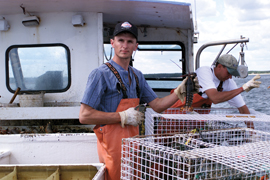
Lobster Institute Celebrating 25th Anniversary
Since 1987 the University of Maine-based Lobster Institute has worked to sustain both a viable lobster resource and lobster fishery through conservation, outreach, research and education.
The institute will celebrate on Friday, Sept. 21, its 25 years of work for lobstermen and all sectors of the lobster industry, from Newfoundland to Long Island Sound, with a research showcase at UMaine’s Memorial Union and an awards ceremony at a dinner that night.
The showcase, which will run from 11 a.m. to 3 p.m., is free and open to the public and will be held in the atrium area in front of the UMaine bookstore in the Union. It will feature more than 20 poster presentations and displays of a range of
projects including lobster health sampling; bait amounts; stock assessment; and value-added product development.
Displays include a model of the Habitat Mooring System, a new concept in moorings that was developed with assistance from UMaine engineers and marine scientists; a mounted lobster shell nearly 30 inches long; lobster traps and tools; and an exhibit tracing the history of the institute.
There will be a special hour from 1 p.m. to 2 p.m. for news media interested in interviewing Lobster Institute officials such as Dr. Robert Bayer, who has served since 1995 as executive director of the institute, associate director Cathy Billings,
and researchers affiliated with the institute.
The anniversary celebration continues Friday night at an awards ceremony and dinner on the UMaine campus. The dinner is sold out.
The Lobster Institute was founded by five major stakeholders — the Maine Lobstermen’s Association, the Massachusetts Lobstermen’s Association, the Maine Pound Owners Association, the Maine Import/Export Dealer’s Association and the University of Maine — who recognized the lobster fishery in Maine and surrounding areas was the signature fishery of the North Atlantic. Further, they understood that protecting this invaluable natural resource, which was the cornerstone to a vast structure comprised of economically related businesses and culturally related lifestyles and art forms, was incumbent upon the industry itself and the communities and states in which those industries were relied upon to thrive.
The founders supported the creation of a research and educational entity designed to conduct scientific investigation on and provide information about the American lobster (Homarus americanus) in order to help conserve and enhance the resource, and ensure the continuance of a strong and healthy lobster industry in Maine and the region. The University of Maine Board of Trustees approved the creation of the Lobster Institute at the University of Maine in 1987.
In the years since its inception, the landings and values of the lobster catch have risen. From 1994 to 1999 the increase in landings reported in Maine alone was 13.5 million pounds. In 2011, the dockside value of Maine’s catch hit a record 103.8 million pounds, valued at $331.4 million, with an estimated economic impact on the state economy of over $1 billion. Today, there are approximately 6,000 commercial lobster license holders in Maine, more than 2,000 in Massachusetts and slightly fewer in Connecticut, New Hampshire, New Jersey, New York and Rhode Island. There are thousands of recreational licenses issued yearly as well. In addition, Canada has a thriving lobster fishery in the Maritime Provinces, and is the largest supplier of the American lobster worldwide. The Lobster Institute works with all of these regions, which all share the same invaluable natural resource — the American lobster.
Contact: Cathy Billings, (207) 581-2751, (207) 949-2028 or cathy.billings@umit.maine.edu; Jessica Bloch, (207) 581-3777 or jessica.bloch@umit.maine.edu
